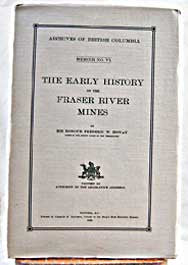Cat No.: CA0426:
It seems to have been just a coincidence that when the easy pickings of the California gold fields became scarce and the resident miners were casting around for new grounds, the news of finds of placer gold in the gravelly bars of the lower Fraser river was circulating. Whatever the reason, there started a headlong rush up the Fraser to the headwaters where experience taught there would be even greater riches to be found. June of 1858 saw as many as 10,000 miners leaving from San Francisco alone with a peak influx of 25 to 30 thousand fortune hunters descending on the area in just three months. All this into an area which had previously only experienced an occasional solitary hunter or trapper, which had no infrastructure or facilities save a few Hudson's Bay Company trading posts (forts), and nothing in the way of roads other than a couple of indian foot trails.
The occupation and settlement of the western territories, up until this time, had been (mostly) concentrated along the coasts, so this inland area was not claimed, or administered, by any recognized authority, so this enormous, highly mixed, group found themselves with no rule of law, no higher authority, in fact none of the regular trappings of civilization or society we are so used to taking for granted. (Except perhaps for the law of the HBC which really only applied where they had a financial interest.) It was no surprise then that extremely anti-social behaviour ran rampant causing the nearest representative of government, James Douglas, Governor of the Island of British Columbia, to declare the whole area under his jurisdiction and almost incidentally founded what was to be the Province of British Columbia.
Following a 10 page Introduction which lays out these events in order and in some detail this book is a collection of (transcriptions of) the significant letters, reports and other documents. The following quote from the introduction explains the selection of these letters and other documents.:
“The letters that are in this volume consist of a part of the correspondence of Richard Hicks from October, 1858, to May, 1859; of Chartres Brew, the Chief Inspector of Police and Assistant Chief Gold Commissioner, from November, 1858, to April, 1859; of Judge Begbie from January, 1859, to March, 1859; together with a few scattered but illuminating documents. The selection, however, has been carefully made with the view of showing the men and the life of the time, the difficulties of maintaining order and collecting revenue, and generally the conditions prevailing in the Colony of British Columbia — that is, on Fraser River — when it was in its swaddling-clothes”
The book, published as a Memoir of the Archives of British Columbia in 1926, was compiled and edited by His Honour, Frederic W. Howay (1867-1943, Judge of the County Court of New Westminster), an acknowledged expert in the history of British Columbia and author of / contributor to, many books on “local” historic subjects.
We invite you to join us in thanking the Community Library of Slocan, and their librarian Joyce Johnson for allowing us to bring you this digital reproduction of another wonderful record of Canada’s, and BC’s, history and rich heritage.
No. of CDs is: 1 ; Format is: PDF ; Searchable?: YES;
FastFind: Yes; ISBN No.: 978-1-927503-36-2 ;


